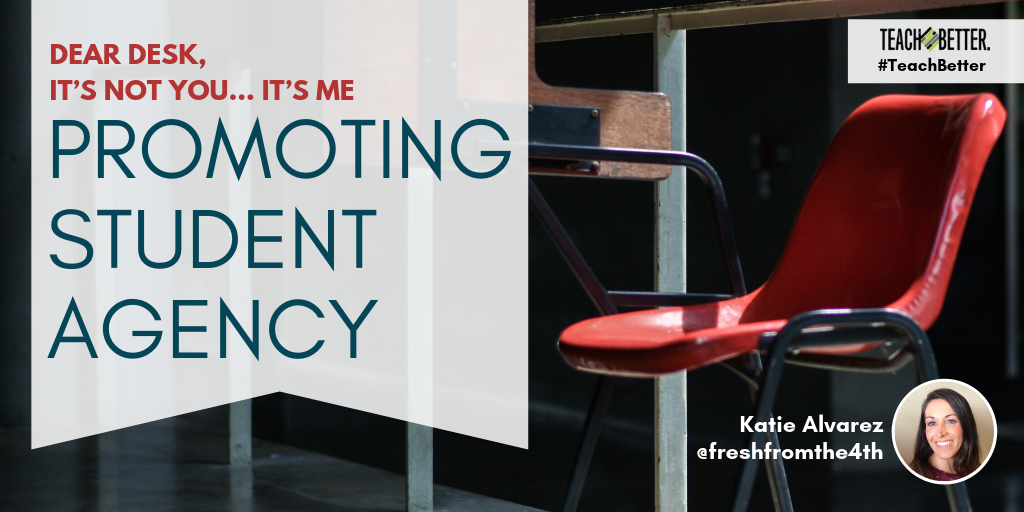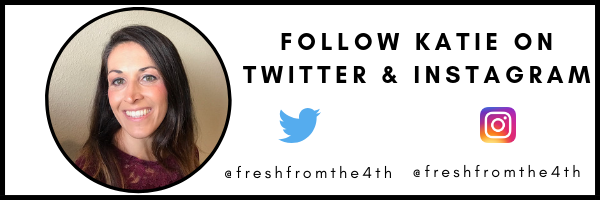In This Post:
- After removing a desk from our learning space, my students reacted with excitement.
- My realization was that I was too focused on how I saw things, and not on how THEY see them.
- This lead to 5 pedagogical shifts to promote student agency.
In a lonely corner of an elementary classroom stood an oversized wooden desk. Its oak surface was fully adorned in stacks of ungraded papers, dried-out Expo markers, coffee rings, and nurses’ notes. Beside the disheveled and neglected desk rested an oversized office chair that served as a reliable coat rack. After a 3-year relationship, I decided to break up with my teacher’s desk. My desktop set on a nook on the built-in cabinets and that would suffice. My initial thought was that I could use space more wisely once my desk packed its things and moved out. Besides, once I had more space to work with, I will then have the ability to actually look at a website like https://www.officemonster.co.uk/ or others to find myself a better desk and chair that will be put to much better use by me throughout the years.
If students don't feel like they are heard, they will stop talking. Click To TweetThe next day, the students came in the room and planted their flag in the space the desk once sat and began planning what they could do with this newly discovered territory. I watched, confusedly, wondering what was so appealing about this extra space to these kids. Throughout the day, I thought about what I was going to do with the space. I mean, “There’s so much room for activities.”
Then, it hit me! This question regarding the extra space was not about how I planned to utilize it to achieve my goals, but rather how they (my students) planned to utilize it to achieve theirs.
My students’ reaction helped me see that I was not promoting student agency very well. What was I owning, that they should be?
This post is not to argue whether teachers should or should not have a desk, but rather to explain how this choice triggered a series of 5 pedagogical shifts to promote student agency.
Shift 1: Managing time with intention
I really didn’t realize how much I was talking throughout a day until I started setting a timer. Lecturing put my students into the learning pit and gave them little opportunity to climb out of it. There was no student agency in that practice. From that moment on I became more mindful about how I structured class time to better promote student agency.
Along with a timer for myself, I began implementing more student talk opportunities and made sure student work time took up the bulk of the block. When the day is intentionally structured to put a spotlight on the learner it sends them a message of empowerment. I quickly learned that lecture is not a daily necessity. Frankly, when students have set goals, they want as much time as possible to work towards accomplishing them and to reflect as well. The less I stood in the spotlight, the more time they had for discovery.
Shift 2: Ask more questions
Student agency is rooted in self efficacy and a growth mindset mentality, and not all students walk into the room with this skill set. On occasion, or maybe a hundred occasions, I have wanted to just scream, “My job isn’t to spoon-feed you!” That would not have gone over well. I had to focus on how I verbally responded to symptoms of learned helplessness My students didn’t have to plan, struggle, and most sadly, own the knowledge gained when I revealed too much.
How could I get my students to be more persistent independent thinkers?
My solution: ask more questions, give less information, and do it consistently. For example, a student states that he/she doesn’t get this word problem. Instead of immediately jumping in with a strategy or explanation, I respond with a question such as, “What have you tried?” or “What part is problematic?”. My personal favorite question is, “What are 2 questions you can ask yourself before moving forward?” These question based conversations helped me provide more leveled, intentional feedback that could solidify a culture of student agency. The less I revealed to them, the more they revealed to me about their learning.
Shift 3: Focus on self monitoring behaviors
I can’t stress the importance of focusing on self monitoring enough. In the beginning of this series of shifts [cue cafe instrumental music] I had this harmonious vision of all the students working on their goals while I casually strolled through the classroom and having highly productive conferences with each learner. The reality: hands up everywhere, kids walking around the room pretending to look for something, off task conversations, an increase in bathroom breaks, and one on one conferences being interrupted, while the chorus of Party Up played on repeat in my head.
When I felt like my vision for student agency was falling apart, it was often due to a crack in the self monitoring component. If you want students to own the learning, they have to understand how they learn. Some self monitoring behaviors that I had to address often were; attending to a task, consulting with peers, recognizing when changes need to be made, and using resources independently.
My advice: whenever an opportunity presents itself, model these skills. Teaching students strategies for independent problem solving is challenging and on-going. Let me just say this though, IT’S WORTH IT. Know that you are helping them become lifelong learners who are equipped with skills desirable in the 21st Century.
My finding: The less I controlled the learning, the more self monitoring skills they gained.
[scroll down to keep reading]
Shift 4: Goal Setting and progress tracking
To promote student agency, meta-cognitive skills, like goal setting and progress tracking, are essentials. Students have to be aware of where they stand in the learning process. Creating student friendly monitoring systems, displaying flowcharts, and having authentic conversations with students about their learning were helpful. Easy-to-use frameworks to document progress can make all the difference.
It wasn’t until last year that I began promoting student agency through self-paced units. By doing this students were working towards goals and tracking their progress with even more ownership. The word “yet” became a powerful and common word in our classroom. In my opinion, “yet” is a must when you are trying to build a culture of student agency. If all students have to demonstrate mastery at the same pace, the foundation of it becomes shaky to them.
The less I focused on deadlines, the more they owned their individual learning process.
Shift 5: Capitalize on student feedback
At many points during my series of shifts I lacked confidence and wanted to just go back to the “old ways” of running my classroom. I knew I couldn’t throw in the towel. By this point, I had already thrown out my own desk, fully implemented flexible seating, and even created standard based units that promoted student agency. I can’t tell you how grateful I was for these periods of hesitation. These moments led me to seek feedback from those that mattered most, my students. Even at 9 and 10 years old, these learners had voice and wanted choice.
I wasn’t ready to jump onto the personalized passion project bandwagon so I started small. Those small changes made big impacts. Some ways I promoted the elements of voice and choice was through surveys, class meetings, giving them a say in short term planning, and adjusting DOK on a learning goal.
There are so many fabulous ways to gather student voice and provide choice. The most important part of this shift was my reaction to the feedback. How these voices and choices are then used to impact the learning is pivotal. When a student shows passion in a given topic, give them the floor. If students don’t feel like they are heard, they will stop talking. I learned quickly that simply listening is not enough if student agency is the goal. The less decision-making I owned, the more meaningful they found learning to be.
Final Thoughts
Promoting student agency is just as much a journey for the educator as it is the students. It doesn’t happen overnight, and it requires commitment. Implementing Genius Hour, Passion Projects, or anything of the like to provide student voice and choice, requires thoughtful and intentional moves that support student agency. What fastens student agency to the foundation are skills and mindsets. More often than not those skills and mindsets have to be explicitly modeled and taught. Who knows, maybe student agency is your own passion project.
The departure of my desk triggered the entrance of a new beginning. You see, the classroom space the desk was taking up was never mine to begin with and the learning that was taking place was never mine either. Nothing against my desk, but we just didn’t bring out the best in each other. Our separation would usher in a better mindset regarding who truly owned the learning experiences.
Oh! In case you may be wondering, the space once taken up by my teacher desk is now being taken up by a shelving unit turned into a working bar+charging station. An idea sparked by a student.
About Katie Alvarez
I taught 4th grade for seven years before transitioning into my current role as a K-12 instructional facilitator in my district. I grew up in the foothills of the Central Valley in California and now live in Cowley, Wyoming with my husband and 3 daughters. My professional passions include all things education, student centered learning, and helping educators bring best practices into their classroom.



